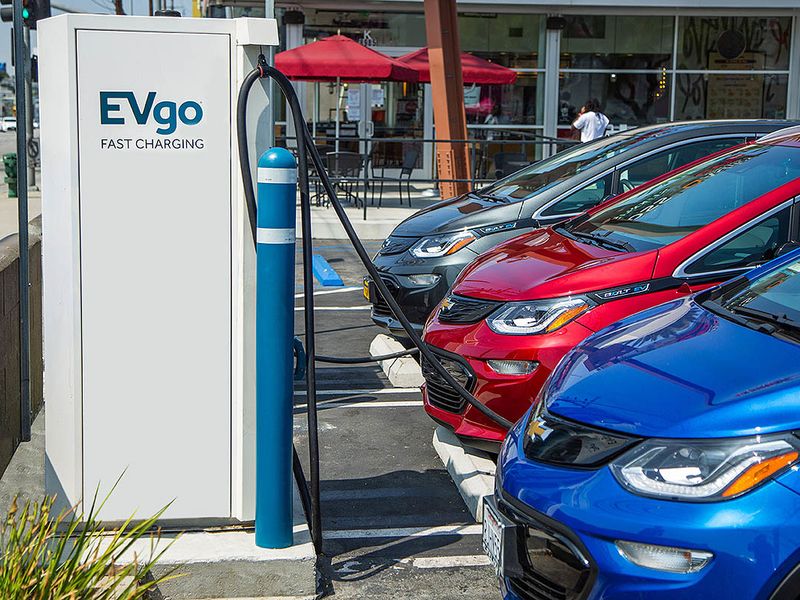
DETROIT— General Motors and EVgo have partnered to triple the size of EVgo’s U.S. fast charging network in the next five years, aiming to solve one of the major roadblocks to electric vehicle adoption.
GM and EVgo will add more than 2,700 fast chargers to cities and suburbs starting next year. The expansion will target about 40 metro areas and will make EV charging more accessible and convenient, GM says.
The broader network will increase charging access for drivers who live in multi-unit homes, rent their homes and can’t install chargers, or lack access to workplace charging, GM and EVgo said in a joint statement Friday. The companies declined to provide financial details of the partnership.
The partnership “is a proof point that we believe very strongly that [EV sales and EV charging] have to come together. In order to have confidence to have an EV as your only vehicle, you have to know there’s robust and fast charging available,” GM CEO Mary Barra told reporters Friday.
“Our relationship with EVgo will bolster the public fast charging network available to EV customers ahead of increased market demand and reinforce our commitment to an all-electric, zero-emissions future,” Barra said in the statement.
The partnership with EVgo is the latest step in GM’s path toward electrification. The automaker plans to invest $20 billion in EV and autonomous vehicle programs through 2025 and launch 20 EVs globally by 2023. This month, GM teased a roster of 12 upcoming EVs in its Sustainability Report. Most of them will be powered by GM’s proprietary Ultium battery, which will be developed with LG Chem.
Last year, GM partnered with Qmerit to help EV owners obtain quotes to install chargers at their homes, and in March, GM said it would expand workplace charging by adding 3,500 charging plugs at GM facilities in the U.S. and Canada.
The partnership is not only positive for GM, it also benefits the EV market, Sam Abuelsamid, principal research analyst at Guidehouse Inisghts, told Automotive News.
Unlike Tesla’s proprietary network of chargers, EVgo’s charging stations can power vehicles of any brand.
GM’s investment “is a small piece of a larger puzzle,” Abuelsamid said. Guidehouse forecasts that by 2025, there will be 64,000 fast chargers in the U.S. By 2030, the total will shoot up to 144,000.
Customers will gain access to the EVgo charging stations at high-traffic locations, such as grocery stores, retail outlets and entertainment centers. Most stations will be able to charge at least four vehicles at once.
Charge times vary based on battery condition, output of charger, vehicle settings and outside temperature, but in many cases, customers will be able to charge their vehicles in 15 to 30 minutes, the companies said.
The stations also will be equipped to charge a more powerful portfolio of EVs coming to the market, with new technology to support 100-kilowatt to 350-kilowatt capabilities. Barra said GM will work with EVgo to ensure that the new chargers meet the technological needs of future EVs.
Advocates have touted the convenience of owning an EV by reminding consumers they can plug in at home, rather than filling up at a gas station. But that’s only true for consumers who have a single-family home that can accommodate a charging station.
“In a lot of areas, especially urban and suburban areas, you have people that live in multi-unit dwellings and apartments, or even if they have a house, they have to rely on street parking. So they can’t plug in at home,” said Abuelsamid. “To have fast charging available where people live in urban and suburban areas, you start to get closer and closer to that convenience level.
“Even if you can’t charge at home, if you can fast charge in 20 or 30 minutes when you go grocery shopping [or] once or twice a week when you run errands, it starts to become a nonissue.”
About 115 million Americans already live within 15 minutes of an EVgo fast charging station, EVgo CEO Cathy Zoi said in the statement. EVgo has more than 800 stations across the U.S., more than any other public fast charging network, the statement said.
“With EV choices rapidly increasing, building more fast charging stations across the U.S. is necessary to extend the power of EVs for more drivers,” Zoi said.
The charging network is part of GM’s commitment to renewable energy and a zero-emission future. The chargers will be completely powered by renewable energy. GM said this year that all U.S. plants will run on renewable energy by 2030 and all global plants will by 2040. And last year, EVgo became the first North American charging company to contract for renewable energy to power its charging stations.
GM and EVgo will rely on private investments, along with government grant and utility programs, to build out the charging infrastructure, the statement said. Expanding the infrastructure to power EVs coming to market will require continued public-private partnership, the companies said.